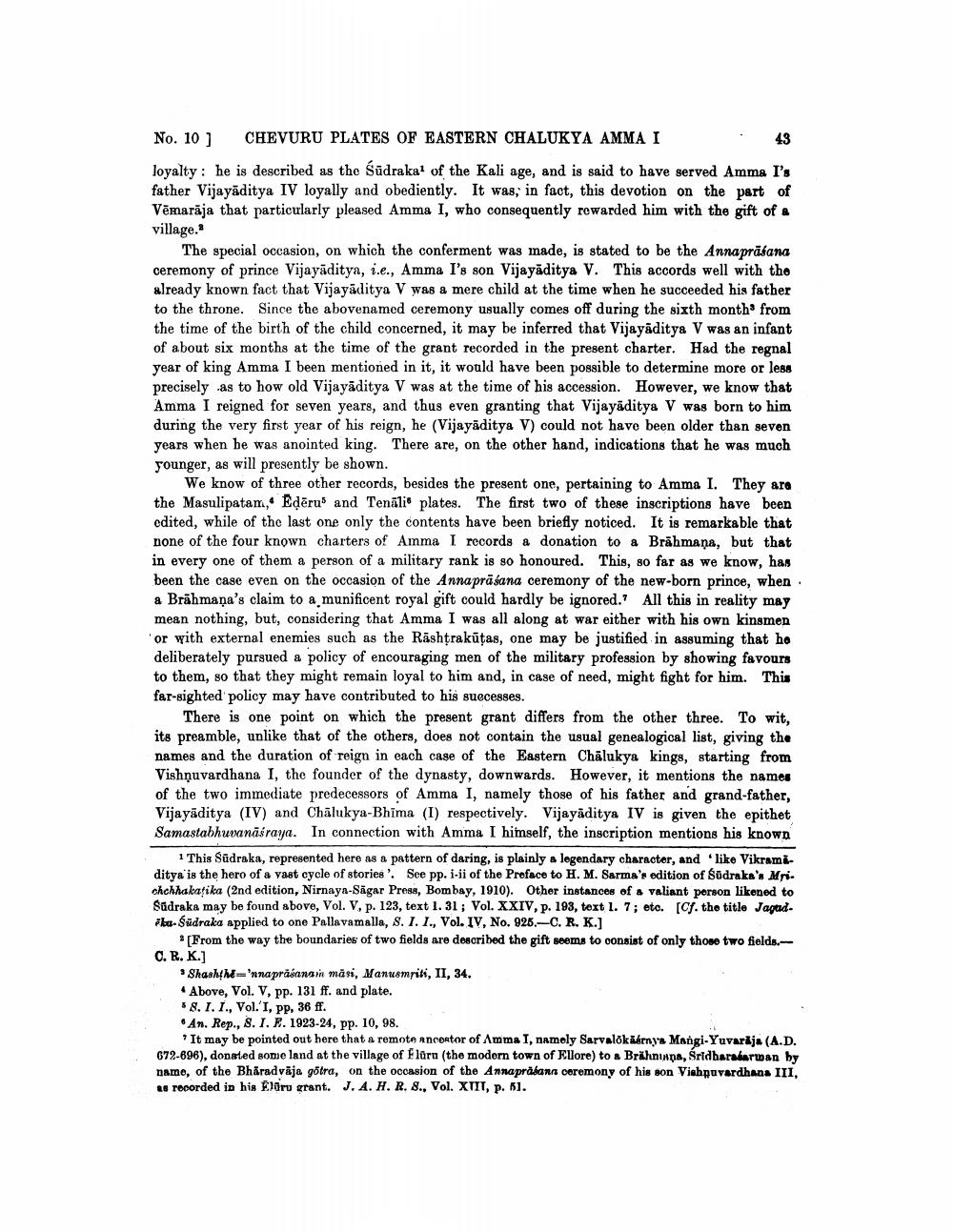________________
43
No. 10 ]
CHEVURU PLATES OF EASTERN CHALUKYA AMMA I
loyalty: he is described as the Sudraka1 of the Kali age, and is said to have served Amma I's father Vijayaditya IV loyally and obediently. It was, in fact, this devotion on the part of Vēmarāja that particularly pleased Amma I, who consequently rewarded him with the gift of a village."
The special occasion, on which the conferment was made, is stated to be the Annaprasana ceremony of prince Vijayaditya, i.e., Amma I's son Vijayaditya V. This accords well with the already known fact that Vijayaditya V was a mere child at the time when he succeeded his father to the throne. Since the abovenamed ceremony usually comes off during the sixth month from the time of the birth of the child concerned, it may be inferred that Vijayaditya V was an infant of about six months at the time of the grant recorded in the present charter. Had the regnal year of king Amma I been mentioned in it, it would have been possible to determine more or less precisely as to how old Vijayaditya V was at the time of his accession. However, we know that Amma I reigned for seven years, and thus even granting that Vijayaditya V was born to him during the very first year of his reign, he (Vijayaditya V) could not have been older than seven years when he was anointed king. There are, on the other hand, indications that he was much younger, as will presently be shown.
We know of three other records, besides the present one, pertaining to Amma I. They are the Masulipatam, Ederus and Tenali plates. The first two of these inscriptions have been edited, while of the last one only the contents have been briefly noticed. It is remarkable that none of the four known charters of Amma I records a donation to a Brahmana, but that in every one of them a person of a military rank is so honoured. This, so far as we know, has been the case even on the occasion of the Annaprasana ceremony of the new-born prince, when a Brāhmaṇa's claim to a munificent royal gift could hardly be ignored. All this in reality may mean nothing, but, considering that Amma I was all along at war either with his own kinsmen or with external enemies such as the Rashtrakutas, one may be justified in assuming that he deliberately pursued a policy of encouraging men of the military profession by showing favours to them, so that they might remain loyal to him and, in case of need, might fight for him. This far-sighted policy may have contributed to his successes.
There is one point on which the present grant differs from the other three. To wit, its preamble, unlike that of the others, does not contain the usual genealogical list, giving the names and the duration of reign in each case of the Eastern Chalukya kings, starting from Vishnuvardhana I, the founder of the dynasty, downwards. However, it mentions the names of the two immediate predecessors of Amma I, namely those of his father and grand-father, Vijayaditya (IV) and Chalukya-Bhima (I) respectively. Vijayaditya IV is given the epithet Samastabhuvanāśraya. In connection with Amma I himself, the inscription mentions his known
1 This Šūdraka, represented here as a pattern of daring, is plainly a legendary character, and 'like Vikramaditya is the hero of a vast cycle of stories'. See pp. i-ii of the Preface to H. M. Sarma's edition of Sudraka's Mri. chchhakatika (2nd edition, Nirnaya-Sagar Press, Bombay, 1910). Other instances of a valiant person likened to Sūdraka may be found above, Vol. V, p. 123, text 1. 31; Vol. XXIV, p. 193, text 1. 7; etc. [Cf. the title JagadPha-Sudraka applied to one Pallavamalla, S. I. I., Vol. IV, No. 925.-C. R. K.]
[From the way the boundaries of two fields are described the gift seems to consist of only those two fields.-C. R. K.]
Shashthe='nnaprasanam māsi, Manusmriti, II, 34.
Above, Vol. V, pp. 131 ff. and plate.
58. I. I., Vol. I, pp, 36 ff.
An. Rep., S. I. E. 1923-24, pp. 10, 98.
'It may be pointed out here that a remote ancestor of Amma I, namely Sarvalokaárnya Mangi-Yuvaraja (A.D. 672-696), donated some land at the village of Fluru (the modern town of Ellore) to a Brähninna, Sridharaiarwan by name, of the Bharadvaja götra, on the occasion of the Annaprasana ceremony of his son Vishnuvardhana III, as recorded in his Eluru grant. J. A. H. R. S., Vol. XIII, p. 51.




